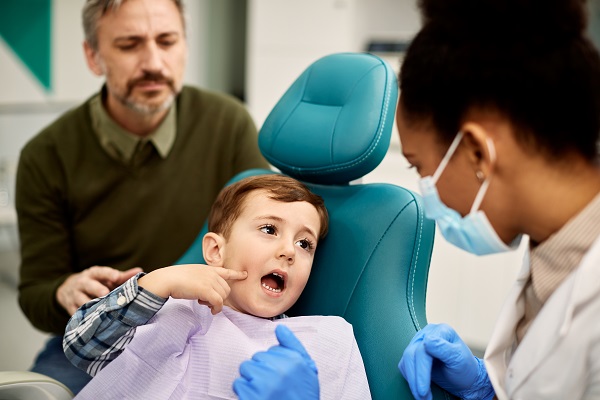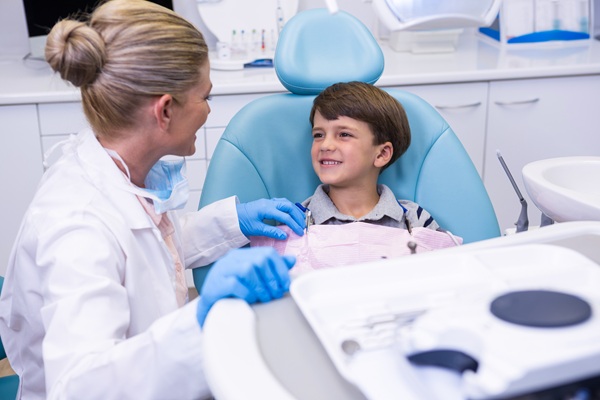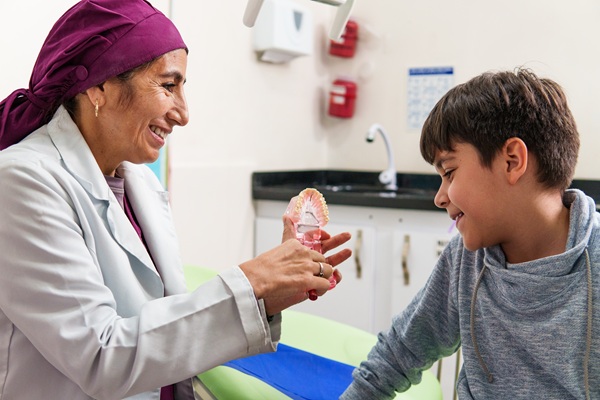When Seeing an Emergency Pediatric Dentist is Recommended

You may know that bringing your child to the dentist twice a year is important, but you may be less sure about when to see an emergency pediatric dentist. Some dental complaints may be able to wait to be treated, but certain symptoms and signs indicate that emergency treatment is necessary.
When to contact an emergency pediatric dentist
There are certain instances in which urgent dental care should be sought. If your child is experiencing any of the following symptoms, you should not wait for treatment.
Broken tooth
A tooth can break from a variety of activities, especially sports. If this occurs, you should gather the pieces of the tooth to bring along to the emergency pediatric dentist appointment. To protect the rest of the mouth, cover the edges of the remaining tooth with wax.
Cracked tooth
A tooth may have a crack but not be completely broken. A crack may not seem like a major deal, but it allows sugar and pieces of food to accumulate, which can quickly lead to tooth decay. You should especially seek emergency treatment if the crack is vertical or diagonal, as this can affect the tooth's root, which can be very painful.
Severe pain and pressure
A minor toothache that comes and goes can probably wait for a regular appointment. However, if your child complains of severe tooth pain, you should seek emergency dental treatment. This is especially true if the child is complaining of accompanying ear pain or pressure.
Knocked-out tooth
If a tooth is completely knocked out, it is important to get to a pediatric dentist as quickly as possible. With an older child, you can clean the tooth with warm water and then place it back inside the socket on the way to the appointment.
Loose or lost fillings
A filling may become loose or even come out entirely. If this occurs, you should see an emergency pediatric dentist get it replaced.
Orthodontic pain
If your child wears braces, there is commonly some pain and discomfort, especially after the wires are recently tightened. However, emergency treatment should be sought if the wires break or if there is unusual pain.
Dental abscess
A dental abscess is a sign of an infection inside the root of the tooth. Signs include swollen, red, or pussy gums, sharp pain, fever, and bad breath or a bad taste in the mouth. Emergency care is necessary to prevent the infection from spreading.
Conclusion
Numerous dental issues should not be ignored. If your child experiences any of these signs, you should see an emergency pediatric dentist as soon as possible. If your child has uncontrolled bleeding in the mouth; severe swelling and pain of the face; or an abrupt and painful injury to the jaw, teeth, or face, you should visit an emergency room or call 911 right away.
You should have dental issues treated as soon as possible, and some conditions warrant seeing an emergency pediatric dentist. If your child needs to be treated, give our office a call right away.
Check out what others are saying about our services on Yelp: Emergency Pediatric Dentist in Dumont, NJ.
Recent Posts
Infants can benefit from seeing a pediatric dentist when primary teeth begin to erupt. Primary teeth are placeholders for permanent teeth and should receive the same attention, including appropriate home care.Primary teeth are crucial to a baby's health and development. Therefore, dentists encourage parents to begin an infant's oral hygiene routine as soon as possible…
Children, who are particularly prone to tooth decay, should brush their teeth twice a day and make regular visits to a pediatric dentist. These healthy habits can help reduce the risks of developing cavities and serious dental issues. Using fluoride toothpaste is also an important step in childhood dental care that can add an extra…
A pediatric root canal is sometimes necessary to prevent the loss of a decayed or damaged baby tooth. Although the goal is to prevent dental cavities and tooth infections, they can still develop, especially in young children (who, on average, are more prone to cavities than teens and adults). It is essential to quickly detect…
A pediatric dentist can help prevent tooth decay. Early dental checkups will enable the dentist to provide treatments that can make this possible. Your dentist can guide you and your child on how to keep teeth and gums healthy. Here are some effective tips on how to prevent childhood tooth decay straight from a pediatric…


